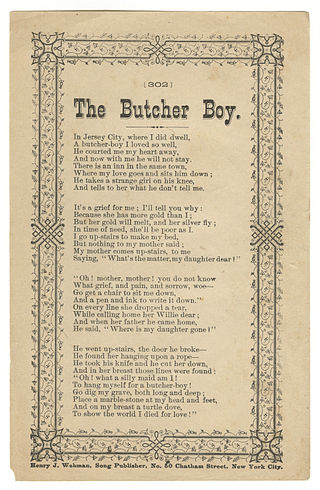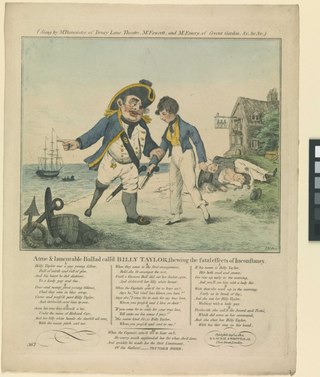Related Research Articles
"Lily of the West" is a traditional British and Irish folk song, best known today as an American folk song, listed as number 957 in the Roud Folk Song Index. The American version is about a man who travels to Louisville and falls in love with a woman named Mary, Flora or Molly, the eponymous Lily of the West. He catches Mary being unfaithful to him, and, in a fit of rage, stabs the man she is with, and is subsequently imprisoned. In spite of this, he finds himself still in love with her. In the original version, the Lily testifies in his defense and he is freed, though they do not resume their relationship.
"The Daemon Lover" – also known as "James Harris", "A Warning for Married Women", "The Distressed Ship Carpenter", "James Herries", "The Carpenter’s Wife", "The Banks of Italy", or "The House-Carpenter" – is a popular ballad dating from the mid-seventeenth century, when the earliest known broadside version of the ballad was entered in the Stationers' Register on 21 February 1657.

"Matty Groves", also known as "Little Musgrave and Lady Barnard" or "Little Musgrave", is a ballad probably originating in Northern England that describes an adulterous tryst between a young man and a noblewoman that is ended when the woman's husband discovers and kills them. It is listed as Child ballad number 81 and number 52 in the Roud Folk Song Index. This song exists in many textual variants and has several variant names. The song dates to at least 1613, and under the title Little Musgrave and Lady Barnard is one of the Child ballads collected by 19th-century American scholar Francis James Child.
"Lady Isabel and the Elf Knight" is the English common name representative of a very large class of European ballads.
"Geordie" is an English language folk song concerning the trial of the eponymous hero whose lover pleads for his life. It is listed as Child ballad 209 and Number 90 in the Roud Folk Song Index. The ballad was traditionally sung across the English speaking world, particularly in England, Scotland and North America, and was performed with many different melodies and lyrics. In recent times, popular versions have been performed and recorded by numerous artists and groups in different languages, mostly inspired by Joan Baez's 1962 recording based on a traditional version from Somerset, England.
"Young Beichan", also known as "Lord Bateman", "Lord Bakeman", "Lord Baker", "Young Bicham" and "Young Bekie", is a traditional folk ballad categorised as Child ballad 53 and Roud 40. The earliest versions date from the late 18th century, but it is probably older, with clear parallels in ballads and folktales across Europe. The song was popular as a broadside ballad in the nineteenth century, and survived well into the twentieth century in the oral tradition in rural areas of most English speaking parts of the world, particularly in England, Scotland and Appalachia.
Lord Lovel is an English-language folk ballad that exists in several variants. This ballad is originally from England, originating in the Late Middle Ages, with the oldest known versions being found in the regions of Gloucestershire, Somerset, Worcestershire, Warwickshire, and Wiltshire.
"Blacksmith", also known as "A Blacksmith Courted Me", is a traditional English folk song listed as number 816 in the Roud Folk Song Index.
The Suffolk Miracle is Child ballad 272 and is listed as #246 in the Roud Folk Song Index. Versions of the ballad have been collected from traditional singers in England, Ireland and North America. The song is also known as "The Holland Handkerchief" and sometimes as "The Lover's Ghost".
The song "All Around my Hat" is of nineteenth-century English origin. In an early version, dating from the 1820s, a Cockney costermonger vowed to be true to his fiancée, who had been sentenced to seven years' transportation to Australia for theft and to mourn his loss of her by wearing green willow sprigs in his hatband for "a twelve-month and a day", the willow being a traditional symbol of mourning. The song was made famous by Steeleye Span, whose rendition may have been based on a more traditional version sung by John Langstaff, in 1975.
"A Brisk Young Sailor (Courted Me)" (variously known as "Bold Young Farmer", "The Alehouse", "Died For Love" and "I Wish My Baby Was Born" amongst other titles) is a traditional folk ballad (Roud # 60, Laws P25), which has been collected from all over Britain, Ireland and North America. The song originates in England in the early 1600s.

"The Cuckoo" is a traditional English folk song, also sung in the United States, Canada, Scotland and Ireland. The song is known by many names, including "The Coo-Coo", "The Coo-Coo Bird", "The Cuckoo Bird", "The Cuckoo Is a Pretty Bird", "The Evening Meeting", "The Unconstant Lover", "Bunclody" and "Going to Georgia". In the United States, the song is sometimes syncretized with the other traditional folk song "Jack of Diamonds". Lyrics usually include the line : "The cuckoo is a pretty bird, she sings as she flies; she brings us glad tidings, and she tells us no lies."

"The Butcher’s Boy" or "The Butcher Boy" is an American folk song derived from traditional English ballads. Folklorists of the early 20th century considered it to be a conglomeration of several English broadside ballads, tracing its stanzas to "Sheffield Park", "The Squire's Daughter", "A Brisk Young Soldier", "A Brisk Young Sailor" and "Sweet William " and "Died for Love".
"One Morning in May" is an English folk song which has been collected from traditional singers in England and the USA and has also been recorded by revival singers. Through the use of double-entendre, at least in the English versions, it tells of an encounter between a grenadier and a lady.
"The Unfortunate Lad" is the correct title of a song printed without a tune on a number of 19th century ballad sheets by Such of London and Carrots and possibly others.
"The Banks of Sweet Primroses", "The Banks of the Sweet Primroses", "Sweet Primroses", "As I Walked Out One Midsummer Morning", "As I Rode Out" or "Stand off, Stand Off" is an English folk song. It was very popular with traditional singers in the south of England, and has been recorded by many singers and groups influenced by the folk revival that began in the 1950s.

"William Taylor" is a British folk song, often collected from traditional singers in England, less so in Scotland, Ireland, Canada and the USA. It tells the story of a young woman who adopts male dress and becomes a sailor in order to search for her lover. Other names include Billy Taylor, Brisk Young Seamen, Bold William Taylor, Down By the Seashore, The False Lover, The Female Lieutenant; Or, Faithless Lover Rewarded, If You'll Get Up Early in the Morning, The Life and Death of Billy Taylor, My Love, Poor William Taylor, Sally Brown and William Taylor, and Young Billy Taylor.
The Lark in the Morning is an English folk song. It was moderately popular with traditional singers in England, less so in Scotland, Ireland and the United States. It starts as a hymn to the ploughboy's life, and often goes on to recount a sexual encounter between a ploughboy and a maiden resulting in pregnancy.
The Golden Glove is an English folk song also popular in Scotland, Ireland and North America. It tells the tale of a young woman who falls in love with a farmer and devises a somewhat far-fetched ruse to win his love. This song is also known as Dog and Gun and The Squire of Tamworth
The Banks of Sweet Dundee is a folk song very popular with and frequently collected from traditional singers in Britain and Ireland, fairly common in North America, and also performed by revival singers and groups. A young woman escapes a forced marriage by shooting dead both the squire who is her intended husband and her uncle who attacks her.
References
- 1 2 3 Roud Folk Song Index https://www.vwml.org/search?ts=1492593671935&collectionfilter=RoudFS;RoudBS&advqtext=0%7Crn%7C152#rec Retrieved 2017/04/19
- ↑ Palmer, Roy (ed.); Bushes and Briars - Folk Songs Collected by Ralph Vaughan Williams; Llanerch; 1999; pp 151-2
- ↑ Purslow, F (ed) rev. Douglas, M and Gardham, S; Marrow Bones: English Folk Songs from the Hammond and Gardiner Manuscripts; London, 2007; pp 88, 167-8
- 1 2 3 Folk-songs of the South; Cox, J H; Harvard; 1925 pp358-361 https://archive.org/details/folksongsofsouth00coxj Retrieved 2017/04/19
- 1 2 English Broadside Ballad Archive http://ebba.english.ucsb.edu/ballad/33978/image Retrieved 2017/04/19
- ↑ Vaughan Williams Memorial Library; Full English Collection; https://www.vwml.org/record/PG/5/81 Retrieved 2017/04/20
- ↑ English Broadside Ballad Archive http://ebba.english.ucsb.edu/search_combined/?ss=early+in+the+spring Retrieved 2017/04/19
- ↑ A Pedlar's Pack of Ballads and Songs, Logan, W. H. and Maidment, J; Edinburgh; 1869; https://archive.org/details/pedlarspackofbal00logarich Retrieved 2017/04/19
- ↑ "Carl T. Sprague – Cowboy Love Song / Following The Cow Trail". Discogs . Retrieved April 18, 2017.
- ↑ "Tobar an Dualchais/Kist of Riches" . Retrieved April 18, 2017.
- ↑ "Max Hunter Collection - Unfaithful Lover". Missouri State University Library . Retrieved April 18, 2017.
- ↑ "Max Hunter Collection - Cowboys Girl". Missouri State University Library . Retrieved April 18, 2017.
- ↑ "Max Hunter Collection - Trail to Mexico". Missouri State University Library . Retrieved April 18, 2017.
- ↑ "Early, Early in the Spring / One Morning in the Spring / The Single Sailor". Mainly Norfolk: English Folk and Other Good Music. Retrieved April 19, 2017.